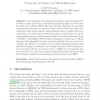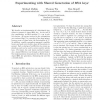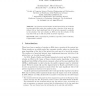22 search results - page 3 / 5 » Factorization of a 768-Bit RSA Modulus |
CHES
2007
Springer
13 years 12 months ago
2007
Springer
The hardness of the integer factorization problem assures the security of some public-key cryptosystems including RSA, and the number field sieve method (NFS), the most efficient ...
NDSS
1999
IEEE
13 years 10 months ago
1999
IEEE
We describe an implementation of a distributed algorithm to generate a shared RSA key. At the end of the computation, an RSA modulus N = pq is publicly known. All servers involved...
CHES
2003
Springer
13 years 11 months ago
2003
Springer
Abstract. Efficient implementations of RSA on computationally limited devices, such as smartcards, often use the CRT technique in combination with Garner’s algorithm in order to ...
CTRSA
2009
Springer
14 years 17 days ago
2009
Springer
Abstract. Fault Analysis is a powerful cryptanalytic technique that enables to break cryptographic implementations embedded in portable devices more efficiently than any other tech...
EUROCRYPT
2005
Springer
13 years 11 months ago
2005
Springer
We present several attacks on RSA that factor the modulus in polynomial time under the condition that a fraction of the most significant bits or least significant bits of the pri...



